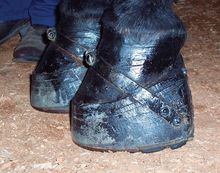The public sale of horses bearing evidence of soring is prohibited by federal law, but The Humane Society of the United States has found evidence that some horse and livestock auctions are not abiding by that law. The HSUS urges the U.S. Department of Agriculture to pursue meaningful penalties against auctions that facilitate the sale of sored horses in violation of the Horse Protection Act.

Stacked hoofs inflicting pain on Tennessee Walking horse
The Prevent All Soring Tactics Act will close the loopholes in the HPA by eliminating the failed system of industry self - policing, prohibiting the use of the “stacks” and chains used to inflict pain on horses and increasing penalties to finally provide an effective deterrent.
© 2014 by APHIS vet Todd Behre
As described in a letter sent to the USDA, The HSUS and Omega Horse Rescue recently rescued an abused Tennessee walking horse from a livestock auction. The horse, now named Dutch, arrived at the auction still wearing tall, heavy stacked shoes used on Big Lick walking horses and with pasterns visibly scarred from years of soring abuse.
Following an investigation into the case, the USDA issued letters of warning to several of the individuals who permitted Dutch to be put up for sale illegally. However, The HSUS urges the USDA to make auctions aware that the sale of sored horses is illegal and will not be tolerated, and to prosecute those that fail to comply.
Dutch, as the “unknown Walking horse” is now known, was destined for about as dishonorable an end as a horse could have: death at a slaughter plant. He represents many others just like him: used, abused, and dumped when no one can wring another dollar out of them, except as meat on the hoof.
In June of 2013, this Tennessee Walking Horse was peddled at a livestock auction in Kentucky with visibly scarred pasterns and wearing stacks that are used on “Big Lick” Walking horses. He was quickly bought by a horse trader and transported to a livestock auction in Tennessee.
From there he was sold again, and shipped to the New Holland auction in Pennsylvania. The USDA was immediately contacted to investigate this sore horse that had been offered for sale at numerous auctions, in violation of the Horse Protection Act.
Those involved with transporting and selling the horse were issued formal warnings. While the original owner was never found, Dutch has spent the last year recovering from his abusive past.
Dutch had been a show horse, forced (through an abusive and illegal training technique called “soring”) to step higher and perform an unnatural, exaggerated gait - the “Big Lick” . Soring involves the application of caustic chemicals to the horse's limbs causing extreme suffering. Whenever ridden - in training or competition - trainers put chains around the horse's sored ankles, which strike and fur ther irritate the already painful areas.
These horses often live in constant and extreme pain throughout their show ring careers. In 1970, Congress passed the Horse Protection Act (HPA) to end the abhorrent practice of soring. This federal law prohibits the public showing, sale and auction of horses that have been sored.
However, the systematic abuse continues to be inflicted on Tennessee Walking Horses, to produce the Big Lick gait rewarded by horse show judges. The Prevent All Soring Tactics (PAST) Act (H.R. 1518/S. 1406) will close the loopholes in the HPA by eliminating the failed system of industry self - policing, prohibiting the use of the “stacks” and chains used to inflict pain on Tennessee Walking, Racking and Spotted Saddle horses, and increasing penalties to finally provide an effective deterrent.
The PAST Act is cosponsored by a majority of both the U.S. House and Senate – 304 Representatives and 57 Senators. It is endorsed by the American Horse Council, the American Veterinary Medical Association, all 50 state veterinary medical associations, the American Association of Equine Practitioners and dozens of leading horse indu stry organizations.
Dutch will always have the scars of his abusive training, but he is a living symbol of why the PAST Act must be enacted
